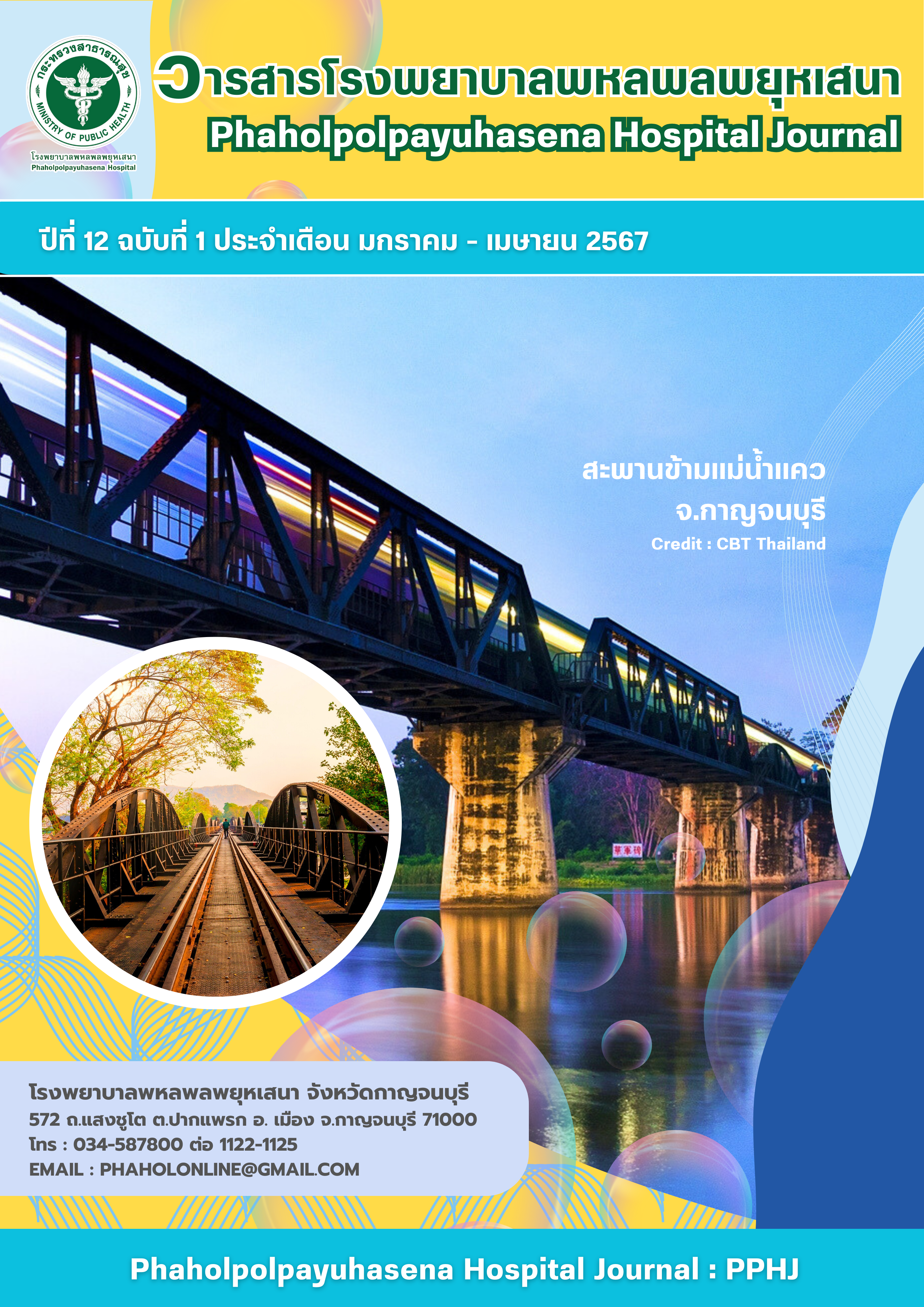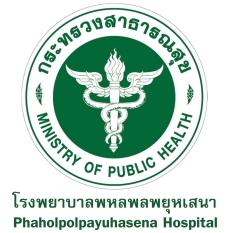Effects of a Weight Loss Program on Health Knowledge and Health Behaviors among the Overweight and Obesity School Age Children at Srisawat Pittayakhom School, Kanchanaburi Province
Keywords:
school age children, obesity and overweight, health knowledge, health behaviorsAbstract
Objectives: To study the effects of a weight loss program on health knowledge and health behaviors among obese and overweight schoolchildren in a school in Kanchanaburi Province.
Methods: A quasi-experimental one-group pre-test and post-test design was conducted from 25 January to 25 March 2024. The sample consisted of 29 obese and overweight schoolchildren. The intervention was a weight loss program that included dietary control and exercise, based on the concept of modifying health behaviors in three aspects (3 Self), for a period of 8 weeks. Data were collected using a health knowledge test for obesity prevention and a health behavior assessment for obesity prevention. The reliability coefficients of the two instruments were 0.84 and 0.75, respectively. Data were analyzed using descriptive statistics and the t-test for independent samples.
Results: After participating in the weight loss program, the sample had significantly higher mean scores for health knowledge and health behaviors (11.31±1.56, 57.14±5.22) compared to before the program (7.38±2.20, 44.28±2.45; p<0.001). The mean weight and body mass index (64.45±11.12, 24.88±2.52) were significantly lower than before the program (67.27±11.03, 26.32±2.54; p=0.001).
Conclusions: The implementation of a weight loss program that incorporates continuous dietary control and exercise has demonstrated positive outcomes in terms of improved health knowledge, enhanced health behaviors, and reduced weight and body mass index among the participating obese and overweight schoolchildren. Therefore, it is recommended that this program be sustained in the long term and replicated in other schools with similar contexts.
References
ตนุพล วิรุฬหการุญ. โรคอ้วน ศัตรูร้ายทำลายสุขภาพ [อินเทอร์เน็ต]. 2564 [เข้าถึงเมื่อ 20 ธันวาคม 2566]. เข้าถึงได้จาก: https://www.ryt9.com/s/prg/3303464
กระทรวงสาธารณสุข. แผนพัฒนาสุขภาพแห่งชาติ ฉ.12 (พ.ศ. 2560–2564) [อินเทอร์เน็ต]. 2560 [เข้าถึงเมื่อ 20 ธันวาคม 2566]. เข้าถึงได้จาก: https://bps.moph.go.th/new_bps/sites/default/files/HealthPlan12_2560_2564.pdf
World health organization.10 facts on obesity[อินเทอร์เน็ต].2564[เข้าถึงเมื่อ 20 ธันวาคม 2566]. เข้าถึงได้จาก: https://www.lakeviewdoctors.com/blog/10-must-know-facts-about-obesity
ศรัญญา ทองทับ. คู่มือลดพุง ลดโรค. พิมพ์ครั้งที่ 2.กรุงเทพฯ: สํานักงานกองทุนสนับสนุนการสร้างเสรีสุขภาพ; 2559.
สุกัญญา คณะวาปี, เกศินี สราญฤทธิชัย. ผลของโปรแกรมการพัฒนาความรอบรู้ด้านสุขภาพร่วมกับโรงเรียนรอบรู้ด้านสุขภาพต่อการปรับเปลี่ยนพฤติกรรมเพื่อป้องกันโรคอ้วนในเด็กวัยเรียนที่มีภาวะน้ำหนักเกิน.วารสารวิชาการสาธารณสุขชุมชน. 2565;8(2):105-18.
นฤมล เฉ่งไล่. ผลของโปรแกรมลดน้ำหนักยุคไทยแลนด์ 4.0 ต่อน้ำหนักตัวของวัยรุ่นน้ำหนักเกิน ในจังหวัดตรัง. วารสารโรงพยาบาลสกลนคร. 2564;24(3):23-33.
สำนักโภชนาการ กรมอนามัย. คู่มือการใช้เกณฑ์อ้างอิงการเจริญเติบโตของเด็กอายุ 6–19 ปี [อินเทอร์เน็ต]. 2564 [เข้าถึงเมื่อ 20 ธันวาคม 2566]. เข้าถึงได้จาก: https://multimedia.anamai.moph.go.th/associates/guide-using-the-growth-criteria-for-children-ages6_19/
พัชรี ดวงจันทร์. บทวิจารณ์เรื่องการปรับเปลี่ยนพฤติกรรมสุขภาพ 3 self ด้วยหลัก PROMISE model.วารสารพฤติกรรมศาสตร์. 2553;16(1):1-13.
กองสุขศึกษา, สถาบันวิจัยพฤติกรรมศาสตร์ มหาวิทยาลัยศรีนครินทรวิโรฒ. คู่มือประเมินความรอบรู้ด้านสุขภาพสำหรับเด็กและเยาวชนที่มีภาวะน้ำหนักเกิน. กรุงเทพฯ: มหาวิทยาลัยศรีนครินทรวิโรฒ; 2557.
กองโภชนาการ กรมอนามัย. คู่มือธงโภชนาการ คณะจัดทำข้อปฏิบัติการกินอาหารเพื่อสุขภาพที่ดีของคนไทย.กรุงเทพฯ: โรงพิมพ์องค์การสงเคราะห์ทหารผ่านศึก; 2550.
พรวิภา ดาวดวง.แนวทางการคัดกรองภาวะสุขภาพเด็กวัยเรียน และระบบฐานข้อมูลการคัดกรองเด็กกลุ่มเสี่ยง [อินเทอร์เน็ต]. 2561 [เข้าถึงเมื่อ 12 ธันวาคม 2566]. เข้าถึงได้จาก: https://nutrition2.anamai.moph.go.th/th/cluster-student-3/download?id=47784&mid=32229&mkey=m_document&lang=th&did=15654
สำนักงานกองทุนสนับสนุนการสร้างเสริมสุขภาพ. ทัวร์อวัยวะ โรคอ้วนลงพุง [อินเทอร์เน็ต]. 2561 [เข้าถึงเมื่อ 12 ธ.ค. 2566]. เข้าถึงได้จาก: https://www.youtube.com/watch?v=n70glotYT7Y
คณะแพทยศาสตร์โรงพยาบาลรามาธิบดี มหาวิทยาลัยมหิดล, สถาบันวิจัยระบบสาธารณสุข. คู่มือแนวทาง การจัดการปัญหาอ้วนลงพุงและภาวะแทรกซ้อน. กรุงเทพฯ: มหาวิทยาลัยมหิดล; 2564.
นภาเพ็ญ จันทขัมมา, สุมัจฉรา มานะชีวกุล, อารี ชีวเกษมสุข, พัทยา แก้วสาร, พรณิศา แสนบุญส่ง. ผลของโปรแกรมการควบคุมภาวะน้ำหนักเกินโดยใช้โรงเรียนเป็นฐานของนักเรียนประถมศึกษาแห่งหนึ่งในจังหวัดนนทบุรี. วารสารแพทย์นาวี. 2563;47(2):301-16.
Downloads
Published
How to Cite
Issue
Section
License
Copyright (c) 2024 Phaholpolpayuhasena Hospital

This work is licensed under a Creative Commons Attribution-NonCommercial-NoDerivatives 4.0 International License.
บทความที่ได้รับการตีพิมพ์เป็นลิขสิทธิ์ของโรงพยาบาลพหลพลพยุหเสนา
ข้อความที่ปรากฏในบทความแต่ละเรื่องในวารสารวิชาการเล่มนี้เป็นความคิดเห็นส่วนตัวของผู้เขียนแต่ละท่านไม่เกี่ยวข้องกับโรงพยาบาลพหลพลพยุหเสนาและบุคลากรท่านอื่น ๆ ในโรงพยาบาลฯ แต่อย่างใด ความรับผิดชอบองค์ประกอบทั้งหมดของบทความแต่ละเรื่องเป็นของผู้เขียนแต่ละท่าน หากมีความผิดพลาดใด ๆ ผู้เขียนแต่ละท่านจะรับผิดชอบบทความของตนเอง



 Phaholpolpayuhasena Hospital
Phaholpolpayuhasena Hospital
